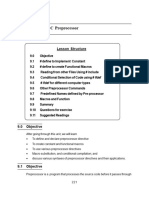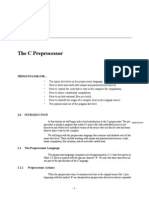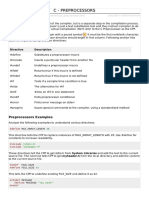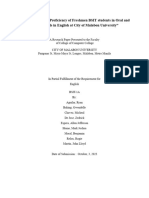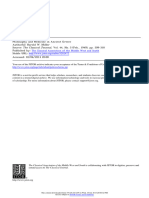C Preprocessor and Macros
Uploaded by
Fahad AbdullahtC Preprocessor and Macros
Uploaded by
Fahad AbdullahtNEW Programiz is now on Youtube!
Take me there
Tutorials Examples Search tutorials and examples
C Programming > C Preprocessor and Macros
C Introduction TOC
C Flow Control
C Preprocessor and Macros
In this tutorial, you will be introduced to c preprocessors, and you will learn to use #include,
C Functions
#define and conditional compilation with the help of examples.
C Programming Arrays
C Programming Pointers
C Programming Strings
Structure And Union
C Programming Files
Additional Topics
C Enumeration
C Preprocessors
C Standard Library
C Programming Examples The C preprocessor is a macro preprocessor (allows you to define macros) that transforms
your program before it is compiled. These transformations can be the inclusion of header file,
macro expansions etc.
All preprocessing directives begin with a # symbol. For example,
Join our newsle er for the latest
updates.
#define PI 3.14
Enter Email Address* Join
Some of the common uses of C preprocessor are:
A DV E RT I S E M E N T S
Including Header Files: #include
The #include preprocessor is used to include header files to C programs. For example,
#include <stdio.h>
Here, stdio.h is a header file. The #include preprocessor directive replaces the above line
with the contents of stdio.h header file.
That's the reason why you need to use #include <stdio.h> before you can use functions like
scanf() and printf() .
You can also create your own header file containing function declaration and include it in
your program using this preprocessor directive.
#include "my_header.h"
Visit this page to learn more about using header files.
Macros using #define
A macro is a fragment of code that is given a name. You can define a macro in C using the
#define preprocessor directive.
Here's an example.
#define c 299792458 // speed of light
Here, when we use c in our program, it is replaced with 299792458 .
Example 1: #define preprocessor
#include <stdio.h>
#define PI 3.1415
int main()
{
float radius, area;
printf("Enter the radius: ");
scanf("%f", &radius);
// Notice, the use of PI
area = PI*radius*radius;
printf("Area=%.2f",area);
return 0;
}
Function like Macros
You can also define macros that work in a similar way like a function call. This is known as
function-like macros. For example,
#define circleArea(r) (3.1415*(r)*(r))
Every time the program encounters circleArea(argument) , it is replaced by
(3.1415*(argument)*(argument)) .
Suppose, we passed 5 as an argument then, it expands as below:
circleArea(5) expands to (3.1415*5*5)
Example 2: Using #define preprocessor
#include <stdio.h>
#define PI 3.1415
#define circleArea(r) (PI*r*r)
int main() {
float radius, area;
printf("Enter the radius: ");
scanf("%f", &radius);
area = circleArea(radius);
printf("Area = %.2f", area);
return 0;
}
Visit this page to learn more about macros and #define preprocessor.
Conditional Compilation
In C programming, you can instruct preprocessor whether to include a block of code or not.
To do so, conditional directives can be used.
It's similar to a if statement with one major difference.
The if statement is tested during the execution time to check whether a block of code
should be executed or not whereas, the conditionals are used to include (or skip) a block of
code in your program before execution.
Uses of Conditional
use different code depending on the machine, operating system
compile same source file in two different programs
to exclude certain code from the program but to keep it as reference for future purpose
How to use conditional?
To use conditional, #ifdef , #if , #defined , #else and #elseif directives are used.
#ifdef Directive
#ifdef MACRO
// conditional codes
#endif
Here, the conditional codes are included in the program only if MACRO is defined.
#if, #elif and #else Directive
#if expression
// conditional codes
#endif
Here, expression is an expression of integer type (can be integers, characters, arithmetic
expression, macros and so on).
The conditional codes are included in the program only if the expression is evaluated to a
non-zero value.
The optional #else directive can be used with #if directive.
#if expression
conditional codes if expression is non-zero
#else
conditional if expression is 0
#endif
You can also add nested conditional to your #if...#else using #elif
#if expression
// conditional codes if expression is non-zero
#elif expression1
// conditional codes if expression is non-zero
#elif expression2
// conditional codes if expression is non-zero
#else
// conditional if all expressions are 0
#endif
#defined
The special operator #defined is used to test whether a certain macro is defined or not. It's
o en used with #if directive.
#if defined BUFFER_SIZE && BUFFER_SIZE >= 2048
// codes
Predefined Macros
Here are some predefined macros in C programming.
Macro Value
__DATE__ A string containing the current date
__FILE__ A string containing the file name
__LINE__ An integer representing the current line number
__STDC__ If follows ANSI standard C, then the value is a nonzero integer
__TIME__ A string containing the current date.
Example 3: Get current time using __TIME__
The following program outputs the current time using __TIME__ macro.
#include <stdio.h>
int main()
{
printf("Current time: %s",__TIME__);
}
Output
Current time: 19:54:39
Recommended Readings
Line control
Pragmas
Preprocessor Output
Other directives
Previous Tutorial: Next Tutorial:
C Enumeration C Standard Library
Share on: Was this article helpful?
Related Tutorials
C Tutorial C Tutorial C Tutorial C Tutorial
C Variables, Constants and C if...else Statement C User-defined functions C Functions
Literals
Tutorials Examples Company Legal
Python 3 Tutorials Python Examples About Privacy Policy
Join our newsle er for the latest
C Tutorials C Examples Advertising Terms & Conditions
updates.
Java Tutorials Java Examples Contact
Enter Email Address* Join
Kotlin Tutorials Kotlin Examples Blog
C++ Tutorials C++ Examples Youtube
Swi Tutorials
C# Tutorials
DSA Tutorials
© Parewa Labs Pvt. Ltd. All rights reserved.
You might also like
- Chapter: Programming and Data Structures: C PreprocessorNo ratings yetChapter: Programming and Data Structures: C Preprocessor12 pages
- 7-Preprocessors-14-03-2022 (14-Mar-2022) Material - I - 14-03-2022 - PreprocessorsNo ratings yet7-Preprocessors-14-03-2022 (14-Mar-2022) Material - I - 14-03-2022 - Preprocessors31 pages
- Preprocessor Directives in C ProgrammingNo ratings yetPreprocessor Directives in C Programming7 pages
- Unit 4 Preprocessor Directives: 1 What Is Pre-Processor?100% (2)Unit 4 Preprocessor Directives: 1 What Is Pre-Processor?6 pages
- Preprocessors The C Preprocessor Is Not Part of THNo ratings yetPreprocessors The C Preprocessor Is Not Part of TH5 pages
- Separate Step in The Compilation Process: Substitution Tool Pre-ProcessingNo ratings yetSeparate Step in The Compilation Process: Substitution Tool Pre-Processing40 pages
- Managerial Economics (EMBA 508) EMBA Program, Spring 2020 Time: Any of Three (03) QuestionsNo ratings yetManagerial Economics (EMBA 508) EMBA Program, Spring 2020 Time: Any of Three (03) Questions1 page
- 2295b - 03092020023838 - 241b0 - EMBA 506 Mid 1 C WrittenNo ratings yet2295b - 03092020023838 - 241b0 - EMBA 506 Mid 1 C Written1 page
- Course Name: Business Mathematics & Applications Course No. EMBA-506 Class Test Section - BNo ratings yetCourse Name: Business Mathematics & Applications Course No. EMBA-506 Class Test Section - B1 page
- Polycarbonate (PC) - Manufacturing Process of PCNo ratings yetPolycarbonate (PC) - Manufacturing Process of PC1 page
- Organizational Behavior: Chapter-3 Attitudes and Job SatisfactionNo ratings yetOrganizational Behavior: Chapter-3 Attitudes and Job Satisfaction16 pages
- 76d61 07112020110242 5744f MID-Term1EHRM-518Summer2020No ratings yet76d61 07112020110242 5744f MID-Term1EHRM-518Summer20201 page
- 3 (Three) : EMBA Program Spring 2020 Section C EMBA-509 (Organizational Behavior) 1 Hour 15No ratings yet3 (Three) : EMBA Program Spring 2020 Section C EMBA-509 (Organizational Behavior) 1 Hour 151 page
- Polymer Nanocomposites: Synthetic and Natural Fillers A ReviewNo ratings yetPolymer Nanocomposites: Synthetic and Natural Fillers A Review21 pages
- Examples of Separation of Variables: Dy DXNo ratings yetExamples of Separation of Variables: Dy DX4 pages
- Corrosion-Induced Hydrogen Embrittlement in Aluminum Alloy 2024No ratings yetCorrosion-Induced Hydrogen Embrittlement in Aluminum Alloy 202416 pages
- Corrosion Study of Iron and Copper Metals and Bras PDFNo ratings yetCorrosion Study of Iron and Copper Metals and Bras PDF5 pages
- Modell Exfol Corrnin Aluminium Alloysfinalrev 11 GCNo ratings yetModell Exfol Corrnin Aluminium Alloysfinalrev 11 GC19 pages
- Degree of Master in Applied Textile Management The Swedish School of TextilesNo ratings yetDegree of Master in Applied Textile Management The Swedish School of Textiles68 pages
- CONVERGE 03-Preparing - The - Surface - GeometryNo ratings yetCONVERGE 03-Preparing - The - Surface - Geometry67 pages
- The Latin Dialect of The Ager Faliscus (Faliscan)No ratings yetThe Latin Dialect of The Ager Faliscus (Faliscan)742 pages
- Sam Shepard: Garden. in 1965 He Presented Up To Thursday and 4-H Clubat Theater 65, Dog and Rocking ChairatNo ratings yetSam Shepard: Garden. in 1965 He Presented Up To Thursday and 4-H Clubat Theater 65, Dog and Rocking Chairat5 pages
- 2023-24 S3 First Term Reading Exam (Question & Answer Book)No ratings yet2023-24 S3 First Term Reading Exam (Question & Answer Book)6 pages
- Assessment To The Proficiency of Freshmen Bsit Students in Oral and Written Skills in English at City of Malabon UniversityNo ratings yetAssessment To The Proficiency of Freshmen Bsit Students in Oral and Written Skills in English at City of Malabon University22 pages
- Clean Craftsmanship Disciplines Standards and Ethics 1st Edition Robert C. Martin download100% (3)Clean Craftsmanship Disciplines Standards and Ethics 1st Edition Robert C. Martin download46 pages
- Report 20220209 Talent Matcht Prueba 1 Backend C.buitron Outlook - Com77911720767No ratings yetReport 20220209 Talent Matcht Prueba 1 Backend C.buitron Outlook - Com7791172076710 pages
- Singro Media Innovations Pvt. LTD: Song Album Album CategorNo ratings yetSingro Media Innovations Pvt. LTD: Song Album Album Categor44 pages
- Philosophy and Medicine in Ancient Greece (The Classical Journal, Vol. 44, Issue 5) (1949)No ratings yetPhilosophy and Medicine in Ancient Greece (The Classical Journal, Vol. 44, Issue 5) (1949)11 pages







